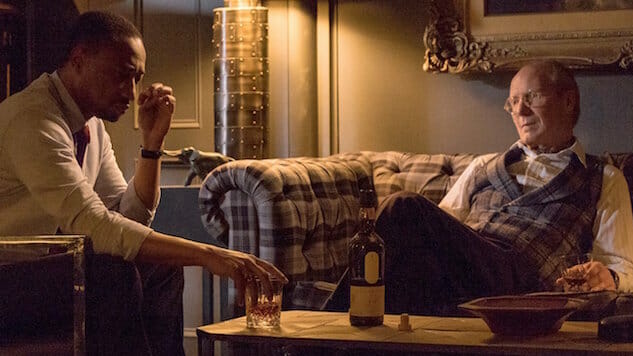Introducing Endless Mode: A New Games & Anime Site from Paste
In the pre-streaming era, event television was something the networks strove for, especially during “sweeps week,” when households were asked to keep track of what they watched for the good people at Nielsen. The way to get new people tuning in was to drop a little bit of controversy or a famous guest star in people’s eye sockets.
David E. Kelley knows that world all too well. He’s the one responsible for the infamous “lesbian kiss” episode of L.A. Law, when two female lawyers locked lips—causing advertisers to balk and viewers to freak out (mostly from joy at a decent representation of a lesbian on a major network drama, it must be said). He repeated the scenario in an episode of his series Picket Fences, and again in a Season Three episode of Ally McBeal. As you could probably guess, the hubbub about those onscreen smooches got quieter and quieter as each one happened.
It’s clear that the sweeps mentality hasn’t left Kelley as he enters the world of streaming television. He’s still offering up that big moment to make the audience rush to their social networks and get a-buzzing. What Kelley apparently hasn’t realized is that the TV universe is light years beyond the gasp-inducing sight of two ladies making out or, in the case of his medical series Chicago Hope, a quick look at bare breasts. He may be in a new world, but he’s still stuck in his old ways.
That could be the only reasonable explanation for the full frontal male nudity on display at the end of Goliath’s fourth episode. Thematically, it makes perfect sense in the world of the show, as the gent in question, Donald Cooperman (William Hurt), is trying to use his powerful position as the head of a law firm, and the major promotion he gave to Lucy, an untested lawyer (Olivia Thirlby), as a means of sleeping with her.
Being the supervillain he is, Cooperman puts a weird plan in motion that involves setting off an alarm in the building and sending Lucy scurrying for the elevator. Once he has her in there, he sends the elevator right to his penthouse lair. For some reason, her curiosity gets the better of her and she slinks into his office. The next thing she and viewers are confronted with is Cooperman’s naked body.
Kelley’s same narrative logic applies to the other big moment from the fourth episode, when McBride (Billy Bob Thornton) heads over to his old house and stumbles upon his ex-wife (Maria Bello) fooling around with his ex-co-worker, Callie (Molly Parker). Again, it’s a logical step for the show—being the attorney for the defense, Callie is trying to get under the skin of her opponent the only way she can: by getting on the skin of his former life partner. That doesn’t make it feel any less gratuitous, especially given Kelley’s seeming fascination with finding shock value in lesbianism.
The disappointment of those unnecessary narrative decisions is only compounded by the fact that Goliath was on an otherwise fine trajectory. Kelley and his co-creator, Jonathan Shapiro, managed to make the presentation of affidavits seem honestly thrilling as Billy laid out the reasons why their case against Borns Technology was valid. And I’m thoroughly enjoying watching the machinations of McBride and his team as they gather evidence and witnesses. Even though they’re lawyers, their work often feels like investigative journalism.
What Kelley has long done well is in writing about flawed people who are great at their jobs. That’s what made Ally McBeal such a success. As messed up and wacky as many of the characters were on a personal level, they were wizards in the courtroom. That’s what keeps me compelled by Goliath. As far off the rails as the show likes to go, there’s nothing better than watching McBride and the other folks in his legal retinue get things done. Even the minor characters like his legal secretary are on their game constantly.
Kelley wants us to root for them to succeed. We want the gang of misfits based in a seedy motel to knock down the mega-corporation and their legal team. Because the writers of this show know that no matter how successful we are, we often see ourselves as the David in any real or assumed David vs. Goliath situation. Kelley, like his fellow TV man Aaron Sorkin, has tapped into that mindset here. He just needs to stop flinging around this “must watch” horseshit along with it.
Robert Ham is an arts and culture journalist based in Portland, OR. Read more of his work here and follow him on Twitter.
